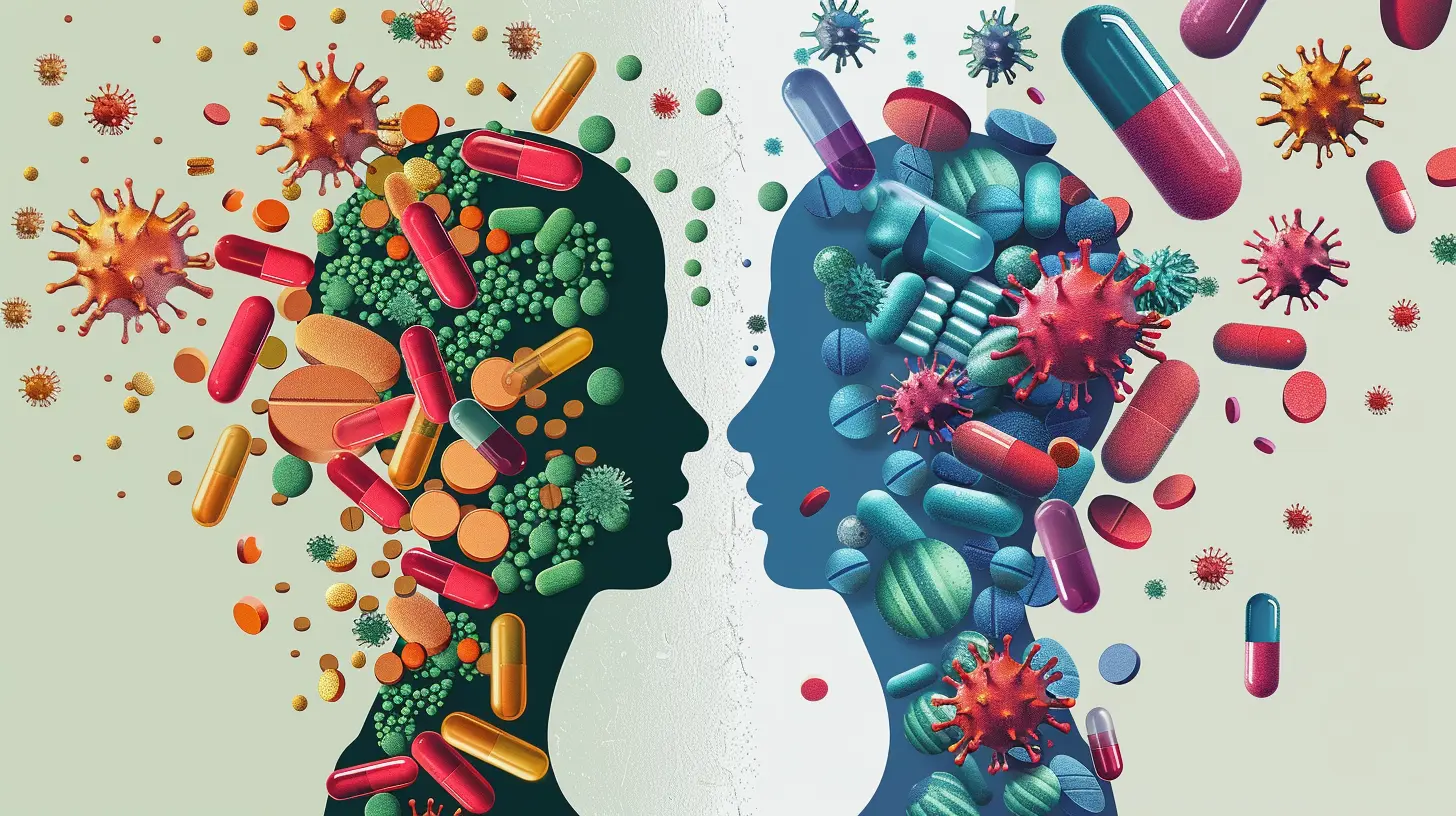Hormonal Imbalance and Its Effect on Immunity
29 October 2025
Ever feel like your body is fighting its own battles behind the scenes? You’re eating right, getting some sleep, managing your stress (well, kinda), and still, you’re either catching every cold or dealing with nagging fatigue that just won’t quit. What if I told you the culprit could be a hormonal imbalance wreaking havoc on your immune system?
Yep, those tiny chemical messengers we call hormones do a lot more than regulate our period or keep our metabolism buzzing. They actually play a major role in how your immune system works—or doesn’t work.
Let’s dive in, shall we? Grab a cup of tea, get comfy, and let me walk you through this fascinating connection between hormonal imbalance and immunity.
What Is Hormonal Imbalance?
So, first things first—what even is a hormonal imbalance?Your body produces over 50 different hormones, and these little guys are responsible for regulating almost everything: mood, sleep, appetite, energy levels, sex drive, metabolism… you name it.
A hormonal imbalance happens when there’s too much or too little of one—or more—of these hormones in your bloodstream. Even a tiny shift can throw your entire body system off course. Think of it like baking a cake. If you add too much sugar or not enough baking powder, you’re not gonna get what you expected.
Some common hormones that tend to go rogue include:
- Estrogen and progesterone (mostly in women)
- Testosterone (mostly in men, but women have it too!)
- Thyroid hormones
- Cortisol (your stress hormone)
- Insulin (regulates blood sugar)
- Melatonin (your sleep regulator)
Your Immune System: The Body’s Defense Squad
Now let’s talk immunity.Your immune system is like your body’s personal army. Its job? To protect you from unwanted invaders—like viruses, bacteria, fungi… even rogue cells that could become cancer.
Your immune system is always on duty. But it needs the right tools, clear signals, and a healthy environment to function properly. And guess who helps with that?
Ding-ding-ding! You guessed it—your hormones.
Hormones and Immunity: What’s the Connection?
Think of hormones as the managers of your immune system. They give orders, regulate actions, and keep things balanced. When your hormones are in sync, your immune system runs like a well-oiled machine. But when they're out of whack—well, things can get messy really fast.Take cortisol for example.
This stress hormone is meant to help you during emergencies. It amps up your alertness and temporarily boosts immunity. But when you’re chronically stressed and cortisol is always high, it starts having the opposite effect. It weakens your immune response, making you more vulnerable to illness.
Same goes for estrogen. It boosts immune function, which is why premenopausal women usually have stronger immune responses than men. But too much estrogen—or too little—can create inflammation and immune dysfunction.
See the pattern?
Hormonal balance = strong immunity. Hormonal chaos = immune hiccups.
How Hormonal Imbalance Can Weaken Your Immune System
Here’s where it gets real. Let’s break down exactly how imbalanced hormones can mess with your immune health:1. Chronic Stress and High Cortisol
Stress is the ultimate hormone disruptor. When you’re stressed for a long time, your adrenal glands keep pumping out cortisol like it’s going out of style.Too much cortisol suppresses the immune system. It reduces white blood cell production, which means your body has fewer soldiers to fight off bacteria and viruses.
Plus, chronic stress can mess with your gut microbiome—home to most of your immune cells.
> Bottom line: If you’re always stressed, your immunity takes a serious hit.
2. Estrogen and Progesterone Fluctuations
Ladies, listen up. Your menstrual cycle isn’t just about cramps and cravings. Estrogen and progesterone levels rise and fall throughout the month—and they directly influence your immune system.Estrogen generally stimulates immune responses. But if levels are too high, it can lead to autoimmune reactions (where your immune system attacks healthy tissues). Too low, and your body becomes more susceptible to infections.
Progesterone helps dial down inflammation—so if it's too low, your immune system can go into overdrive.
> Hormonal swings—whether due to PMS, pregnancy, perimenopause, or menopause—can throw your immunity off-balance.
3. Thyroid Hormones
Hypothyroidism (underactive thyroid) means your cells aren’t getting enough energy, including immune cells. This can slow down immune responses and make infections last longer.On the flip side, hyperthyroidism (overactive thyroid) can cause your immune system to attack your own body (hello, autoimmune diseases like Graves’).
> The thyroid-immunity connection is no joke.
4. Testosterone’s Role
We often think of testosterone as the muscle-building, libido-boosting hormone. But it also plays a role in keeping inflammation in check.Low testosterone in men has been linked to increased immune dysfunction and even higher risk of autoimmune diseases.
> Fellas, if you’re feeling fatigued, getting sick a lot, or just not yourself—it might be time to get those hormone levels tested.
5. Insulin and Blood Sugar Imbalances
Ever heard of inflammation being the root of all chronic illness? Well, insulin resistance (a key feature of prediabetes and diabetes) causes systemic inflammation.Unstable blood sugars can weaken immune defenses, and people with Type 2 diabetes often have impaired immune responses—making it harder to fight infections and heal wounds.
> If your sugar cravings are out of control, your immune system might be silently suffering.
6. Melatonin and Sleep
Melatonin helps regulate your sleep-wake cycles, but it also has powerful antioxidant and immune-boosting effects.Poor sleep? Low melatonin. Low melatonin? Increased inflammation and weakened immunity.
> Skip sleep too often, and you’re basically giving germs a free pass.
Signs That Your Hormones Might Be Messing with Your Immune System
Alright, so how do you know if a hormone imbalance is behind your low immunity?Here are some telltale signs:
- You’re always getting sick
- You feel tired even after eight hours of sleep
- You’ve got brain fog or trouble concentrating
- Your mood is all over the place
- Your periods are irregular or super painful
- You’ve got unexplained weight gain or loss
- Hair thinning, dry skin, or acne
- Digestive issues like bloating or constipation
If you’re nodding along to more than a few of these, it might be worth talking to your doc and getting some hormone panels done.
How to Restore Hormonal Balance (and Boost Your Immunity)
The good news? There’s a lot you can do to bring your hormones back into balance and fire up your immune system.Here’s where to start:
1. Prioritize Sleep Like It’s Your Job
7–9 hours a night. Every night. No excuses.Sleep is when your body repairs, detoxifies, and resets your hormones for the day to come. Try to go to bed and wake up around the same time daily—even on weekends.
2. Reduce Stress (Seriously)
Easier said than done, I know. But chronic stress is one of the biggest hormonal disruptors out there.Try:
- Deep breathing
- Walking in nature
- Journaling
- Listening to calming music
- Saying “no” to things that drain you
Even five minutes a day makes a difference!
3. Eat a Hormone-Healthy Diet
Focus on:- Healthy fats (avocado, nuts, olive oil)
- Lean protein (chicken, tofu, fish)
- Colorful vegetables and fruits
- Whole grains
- Fermented foods (for gut health)
Avoid:
- Processed foods
- Added sugars
- Excess alcohol
- Artificial sweeteners
Food truly is medicine.
4. Move Your Body
Exercise helps regulate insulin, manage weight, reduce stress, and balance estrogen/testosterone levels. Aim for 30 minutes of movement most days—anything counts: walking, yoga, dancing, lifting weights.5. Support Your Gut
Since 70–80% of your immune system lives in your gut, keeping it healthy is crucial.- Eat fermented foods (yogurt, kefir, sauerkraut)
- Add fiber (hello, chia seeds and beans!)
- Consider a quality probiotic
6. Get Those Hormones Checked
Sometimes you need a little help. If you suspect hormone imbalances, work with a healthcare provider to test your levels and create a personalized plan. That might include supplements, bioidentical hormone therapy, or other treatments.Final Thoughts
Your hormones and immune system are like two dancers in perfect rhythm—when one goes off-beat, the whole performance suffers. Ignoring your hormonal health can leave your immune system sluggish, unreliable, or just plain confused.But by tuning in to your body, making some simple lifestyle adjustments, and getting professional guidance if needed, you can bring that balance back—and with it, real vitality.
So next time you’re feeling “off” and can’t quite put your finger on why—think hormones. They might just be the missing puzzle piece in your health journey.
all images in this post were generated using AI tools
Category:
Immune SystemAuthor:

Laurie Barlow
Discussion
rate this article
1 comments
Kate McKinstry
Hormonal balance is crucial for optimal immunity; disruptions can lead to increased vulnerability to infections and chronic illnesses, underscoring the need for integrated health approaches.
November 8, 2025 at 5:44 AM

Laurie Barlow
Thank you for highlighting the importance of hormonal balance in immunity! It’s essential to recognize how intertwined our hormonal health is with our overall well-being.


